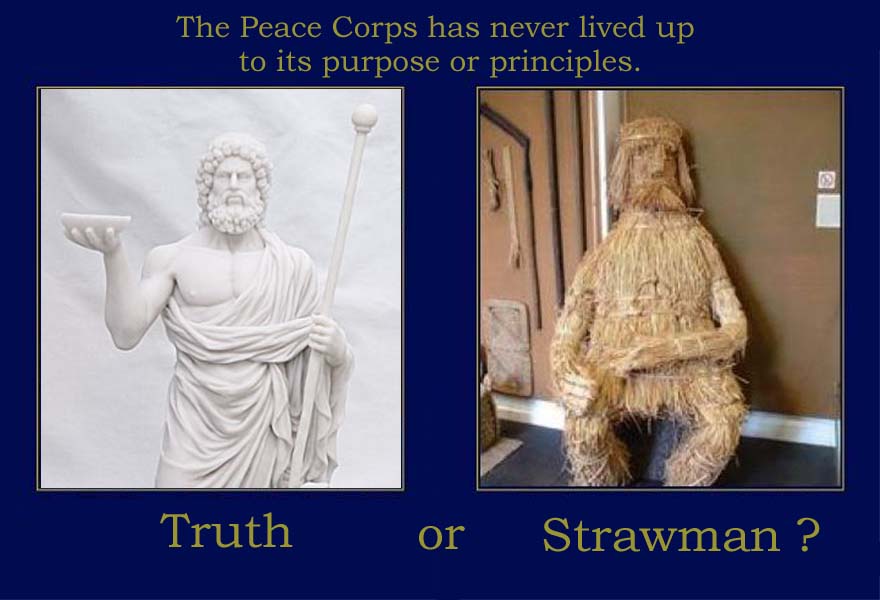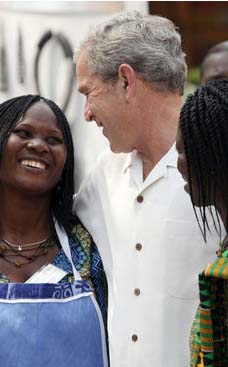
Robert L. Strauss has been a Peace Corps Country Director, recruiter, consultant, and Volunteer. Earlier this year Strauss wrote an op-ed for the New York Times asserting that "Too often young volunteers lack the maturity and professional experience to be effective development workers in the 21st century." Now Strauss has a longer piece in "Foreign Affairs" that says that the Peace Corps has "never lived up to its purpose or principles." Read and comment on the seven myths about the Peace Corps that Strauss refutes.
"Reviewing the most recent U.N. Human Development Report shows that the Peace Corps is active in 10 countries with “high human development,” 49 with “medium human development,” and 11 with “low human development.” With so few resources to achieve its goals, one wonders why the Peace Corps hasn’t concentrated what little it has on the world’s poorest countries, where the need is likely greatest. Granted, half a dozen of those places are either so unstable or dangerous that there’s little hope of achieving much. But even if the Peace Corps didn’t concentrate only on the poorest of the poor, one has to question what it is still doing in Romania and Bulgaria, two countries that have already become members of the European Union. "
Readers can respond directly to "Foreign Policy" by sending and email to Moisés Naím, editor in chief mnaim@CarnegieEndowment.org
Robert L. Strauss writes: The Peace Corps Doesn't Send Volunteers Where They Are Needed Most
Think Again: The Peace Corps
By Robert L. Strauss
Posted April 2008
In the eyes of Americans, no government agency better exemplifies the optimism, can-do spirit, and selfless nature of the United States than the Peace Corps. Unfortunately, it’s never lived up to its purpose or principles.
[Excerpt]
Myth: “The Peace Corps Sends Volunteers Where They Are Needed Most”
Rarely. Like many bureaucracies, the Peace Corps operates predominantly on inertia. The agency sends most volunteers to the same places where volunteers have been sent before, often to do the same thing volunteers were doing 20 and 30 years ago—regardless of whether their mission still makes sense.
Reviewing the most recent U.N. Human Development Report shows that the Peace Corps is active in 10 countries with “high human development,” 49 with “medium human development,” and 11 with “low human development.” With so few resources to achieve its goals, one wonders why the Peace Corps hasn’t concentrated what little it has on the world’s poorest countries, where the need is likely greatest. Granted, half a dozen of those places are either so unstable or dangerous that there’s little hope of achieving much. But even if the Peace Corps didn’t concentrate only on the poorest of the poor, one has to question what it is still doing in Romania and Bulgaria, two countries that have already become members of the European Union.
One might also ask why there is approximately one volunteer sent to Tonga for every 3,800 Tongans but only one sent to Tanzania for every 245,000 Tanzanians. Or what the logic is of having one volunteer for every 2.5 million Mexicans when tens of thousands of Americans live in Mexico, millions of Mexicans live in the United States, and the two countries are among each others’ largest trading partners. The reason, in many cases, is that someone simply decided on a number and no one asked if it made much sense. Of course, closing a program in one country and transferring its resources to another requires explanation and large expenses, and is often resisted by the State Department and by zealous, vocal former volunteers who hate to see programs in their countries shut down.
Some will argue that wherever there are poor people the Peace Corps has a role. But with the Peace Corps’ 8,000 volunteers spread out across more than 70 countries, giving each one such a small presence guarantees that no one can say with any authority if the agency is making a difference or not.
“The Peace Corps Is a Development Organization”
Says who? Since its founding in 1961, the Peace Corps has probably sent more development workers overseas, now upward of 190,000, than any other organization. But if the Peace Corps is a development organization, then it’s a bit like the late, bug-eyed comedian Rodney Dangerfield who, no matter what happened, claimed, “I don’t get no respect.”
Indeed, if the Peace Corps were as successful at development as its literature and many volunteers and staff members attest, one would expect other organizations and scholars to cite it as a model. Yet pick up any of the recently popular books on development by Paul Collier, William Easterly, or Jeffrey Sachs, and you won’t find a single reference to the Peace Corps. Tony Blair’s 464-page Commission for Africa report? Not a word. “Beyond Assistance,” the 215-page report of the HELP Commission on foreign-assistance reform? Just three passing mentions.
The reason the Peace Corps is overlooked as a development organization has a lot to do with the youth and inexperience of the majority of its volunteers. Equally important is its unwillingness to decide if it is a development organization or an organization with a mission “to promote world peace and friendship,” as stipulated by Congress in the Peace Corps Act. It would like to be both, but finds itself falling short on both objectives because it cannot decide which is the more important.
Many Peace Corps staff and volunteers see development work as a burdensome obligation undertaken only to legitimize the cultural exchange aspects of the agency. But without a focus on economic development and an improvement in standards of living, the Peace Corps is really little more than an extended, government-sponsored semester-abroad program. For applicants, the Peace Corps emphasizes the personal experience, not the volunteer’s development impact. That, of course, is not how the Peace Corps pitches itself to foreign governments, to whom it promises significant technical development assistance—only to provide predominantly recent college graduates who may or may not have any useful skills to offer.
The real problem is that the Peace Corps has never done a serious job of evaluating its impact. If it is a world peace and friendship organization designed to “help promote a better understanding of Americans on the part of the peoples served,” then, as a start, it ought to ask the peoples served if they even know which country Peace Corps volunteers come from. If it’s a development agency, then it needs to undertake rigorous measures to assess its impact. Currently, it does neither but rather relies on biannual surveys in which volunteers comment on whether they think they are making a difference. It’s a bit like asking a bunch of doctors how they think they are doing without ever talking to the patients—or even checking to see if they are still alive.
Robert L. Strauss has been a Peace Corps country director, recruiter, consultant, and volunteer. He is a recipient of the State Department’s Meritorious Honor Award and lives in Madagascar, where he runs a management consulting company. He can be reached at RobertLStrauss@hotmail.com.








